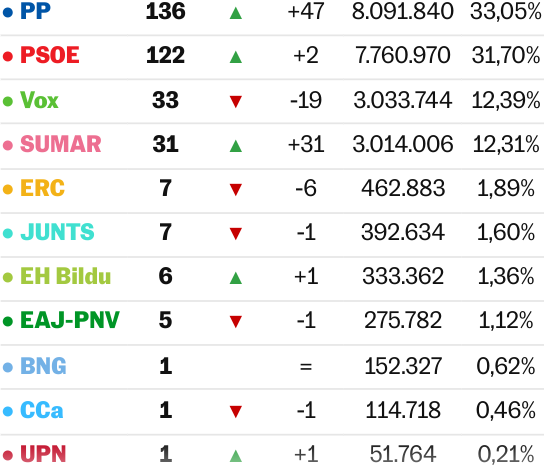Spain's right wing parties performed below expectations in Sunday's parliamentary election, leaving Prime Minister Pedro Sanchez's leftist coalition a narrow chance to retain power.
Spanish Conservative leader Alberto Núñez Feijóo claimed victory after his Popular Party became the largest outfit in the Spanish Congress with 136 seats but his road ahead is bumpy.
Hard-line Vox Retains Third Spot
The Socialists led by Sanchez won 122 seats in the 350-member parliament, two more than its tally in the previous election. However, the ultra-left Sumar alliance won only 31 seats, leaving them at 153 seats.

The hard-right Vox party emerged as the third biggest party in the Spanish Congress, having won 33 seats, down from 52 in the previous election.

Feijóo told his supporters he would try to form a government, though the mood among the party members remained sombre. "As the candidate of the party that won the most seats, I believe it is my duty to try to form a government," Feijoo said. "Spaniards know we have gone from being the second force to the party with the most votes ... I hope this doesn't start a period of uncertainty in Spain," he added.
Better Chance for Socialists
The Socialists were more upbeat after the results came in, as the polls had more or less predicted an outright win for the PP-Vox alliance. "The reactionary bloc of regression, which set out a complete reversal of all the advances that we've achieved over the past four years, has failed," Sanchez told supporters.
A period of uncertainty awaits Spain as both the Conservatives and the Socialists engage in parleys with smaller parties that will hold considerable sway in the hung parliament. Political analysts point out that the Socialists have a better chance of cobbling together a coalition government though they got fewer seats than the Conservatives.
The fact that the PP will have to accept hardline Vox into the government would stop separatist regional parties from extending support to the PP.

Pro-Independence Regional Parties
There are four major separatist parties in the parliament, holding a combined 25 seats. They are Catalonian independence parties ERC and Junts with 7 seats each and Basque separatist parties EH Bildu and EAJ-PNV, who control 11 seats.
The route for the Socialists to gain the support of most of these parties is troublesome as they will face charges of aligning with the separatists to gain power in Madrid. At the other end, PP is unlikely to get the support of any of them as its partner Vox is vocal about crushing regional separatism and has called for clipping the powers of the regional governments.
If both sides fail to form a government in the coming weeks, yet another election will have to be held, according to the Spanish law.
Snap Election
In normal course, Spain's next general election would have been held in 2024, but Sanchez called for early elections after his ruling coalition PSOE suffered stinging defeats in regional and local elections held in May. The PP had criticized the move to hold early elections, saying that the unusually hot summer will drive voters away from the polling booths.









